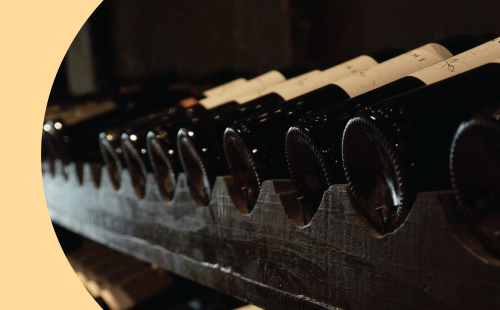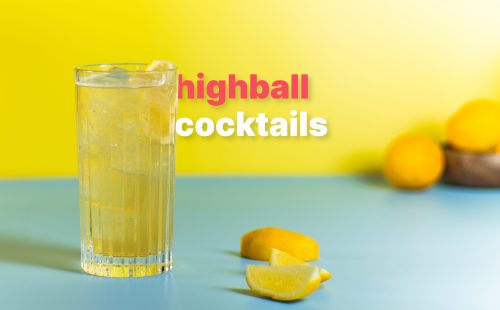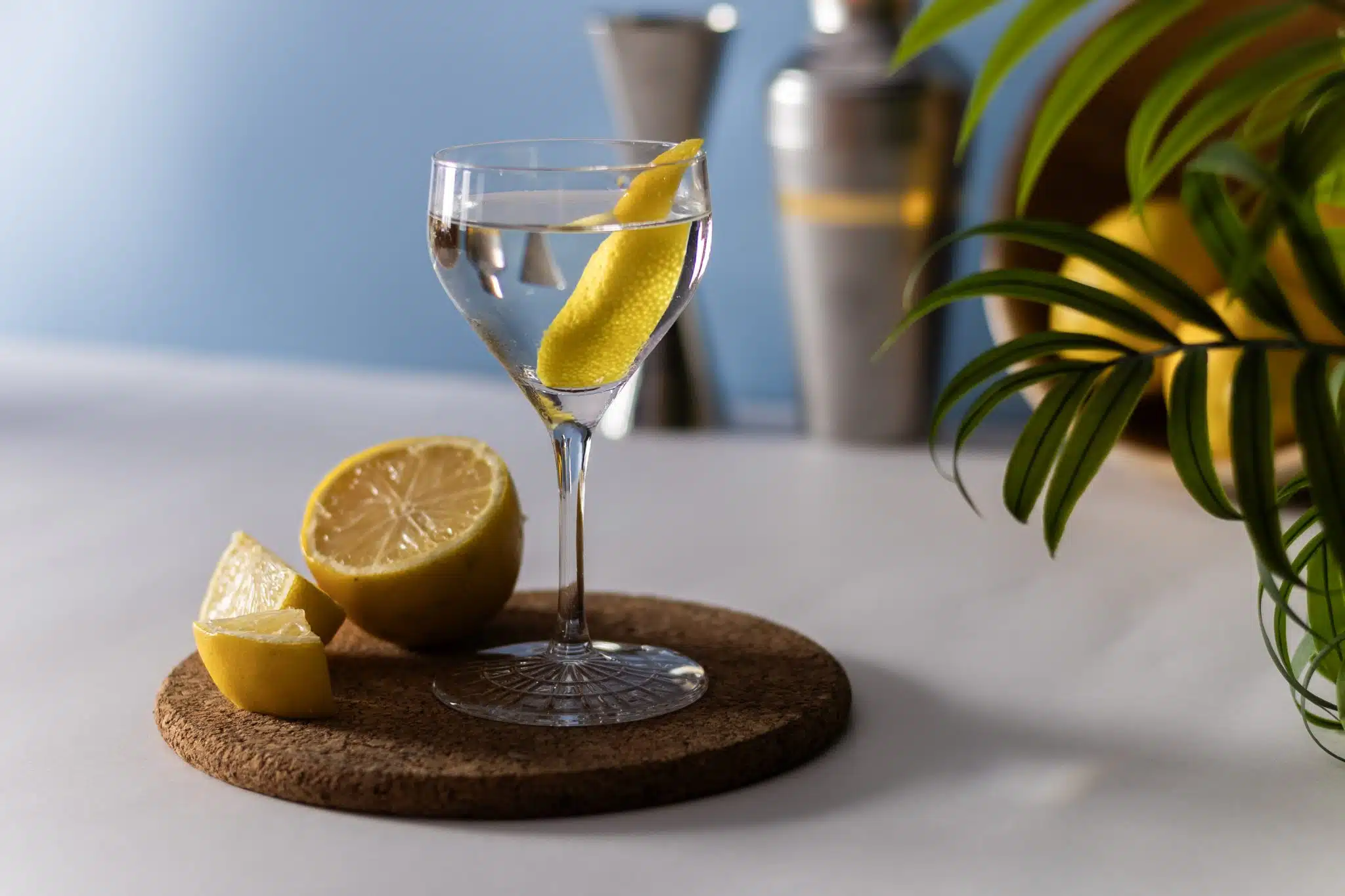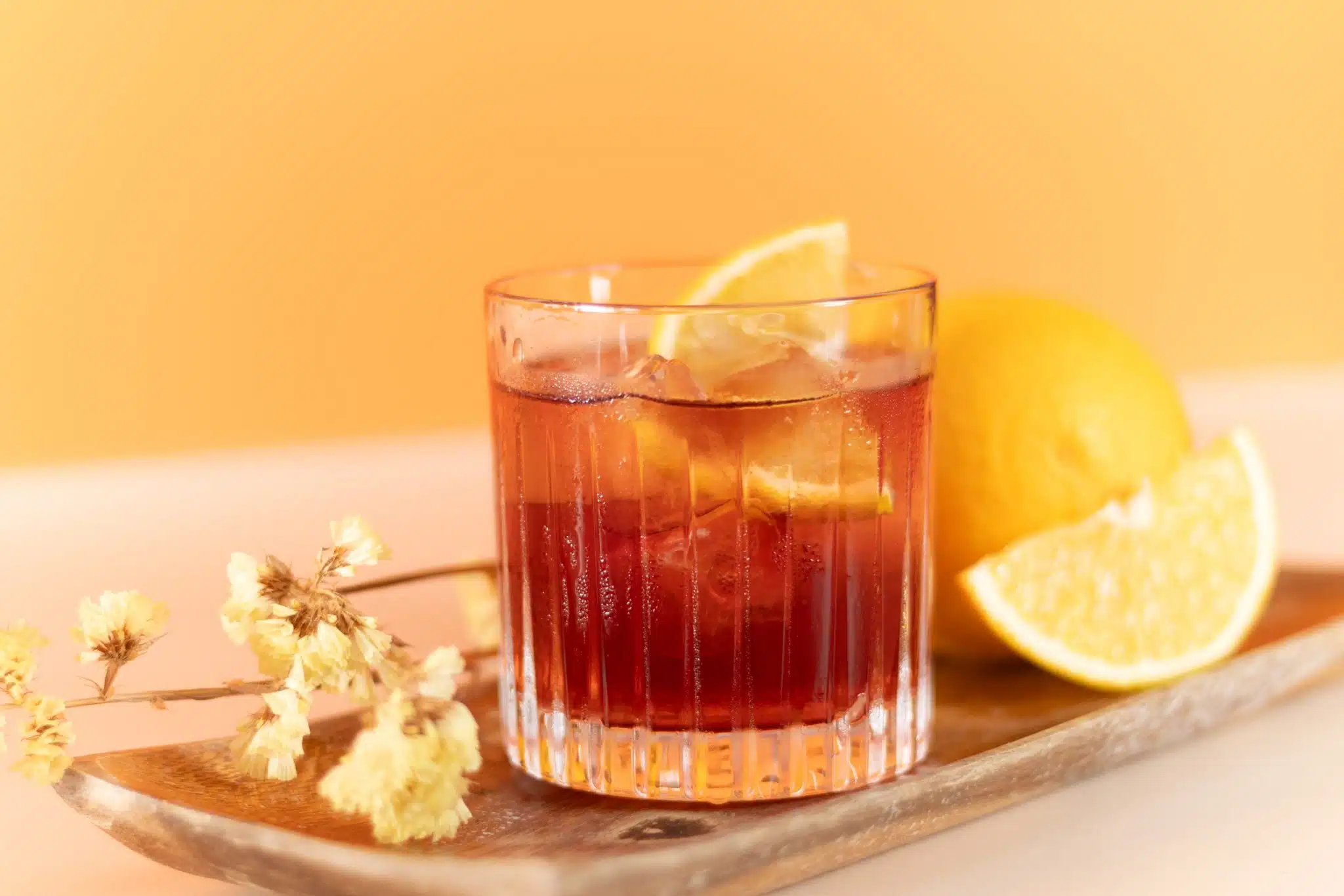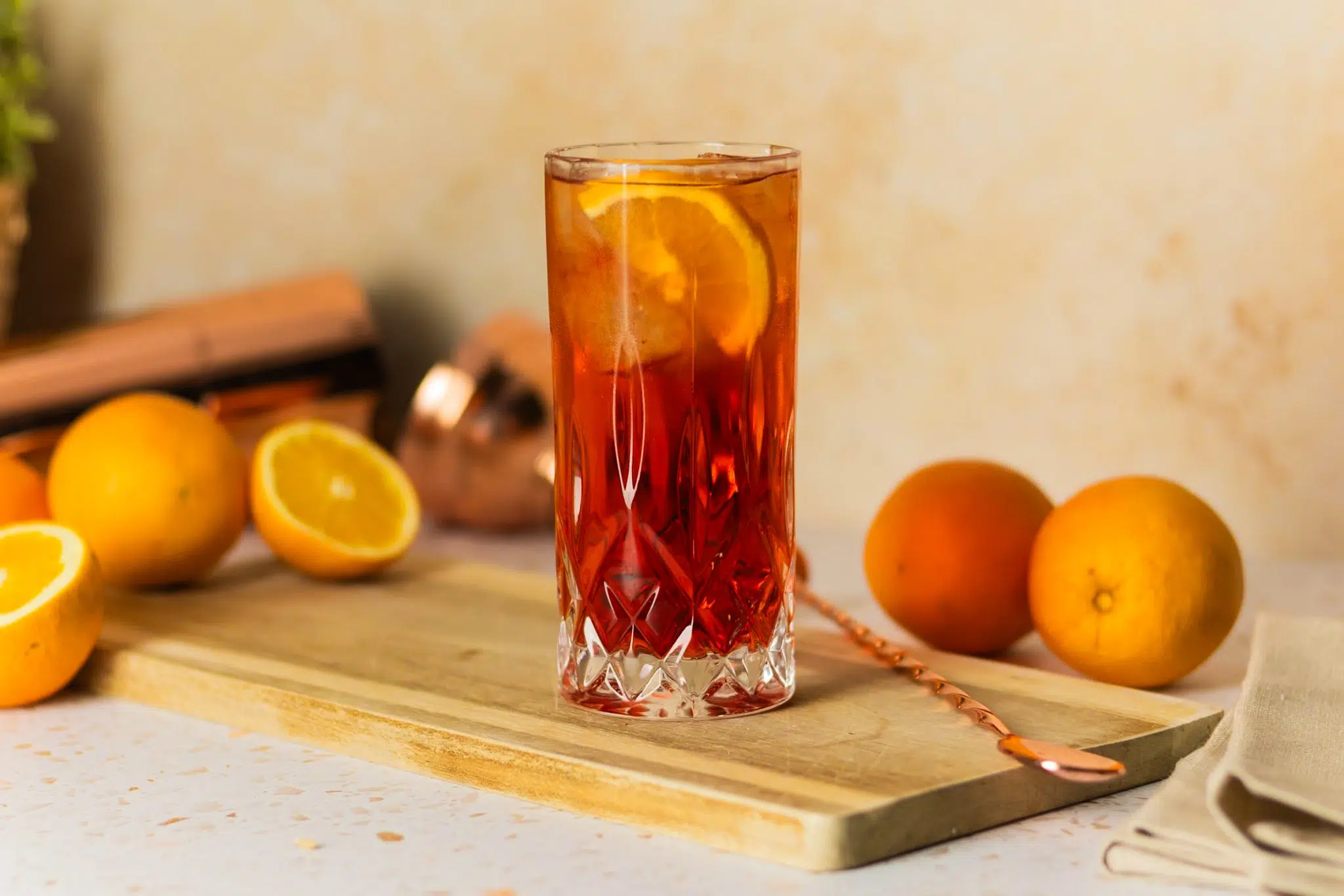Home / Vermouth
- Updated September 13, 2024

Vermouth Guide – What to Know Before You Shop Vermouth Online
Vermouth is a hot topic in the drink world. Everyone has an opinion on how much should go into a martini. Some bartenders say just a little; others say it should be half-and-half with gin or vodka. Some even think you should just swirl it in the glass and throw it out! And did you hear about Winston Churchill? People say he liked his martini so dry that he’d just look towards France, where they make dry Vermouth, instead of adding any to his drink.

What is Vermouth?
Vermouth is a fortified wine with various botanicals, including roots, bark, flowers, seeds, herbs, and spices. It is commonly used in cocktails, especially in martinis and negronis. Two main types are sweet (red) and dry (white). The name comes from the German word “Wermut,” which means wormwood, a mandatory ingredient.
How to say it? It’s pronounced “vr·mooth”
From Sweet to Dry – different types explained

Sweet Vermouth
This type is often red and has a rich and robust flavor. It’s a favorite in cocktails like the Manhattan and the Negroni.
Dry Vermouth
This type is usually clear and offers a crisp and herbal taste. Bartenders commonly use it in martinis and other classic cocktails.
Bianco or Blanc Vermouth
Bianco or Blanc strikes a middle ground between sweet and dry. It’s aromatic and slightly sweet, making it versatile for various drinks.
Rosé Vermouth
Rosé blends elements of both sweet and dry varieties. It provides a balanced taste for those who want something in between.
What does Vermouth taste like?
Vermouth tastes like a fortified wine infused with botanicals, offering a blend of sweet or dry flavors with herbal, spicy, and aromatic undertones.
How much alcohol is in Vermouth?
Vermouth has an Alcohol by Volume (ABV) ranging from 14,5% to 22%, translating to 29 to 44 proof.
It remains gentler than the majority of distilled spirits. For instance, powerhouses like vodka, gin, rum, tequila, and whiskey typically boast an ABV that hovers between 40% and 50%, making them considerably stronger. On the other hand, wines generally have an ABV ranging from 12% to 15%.
Are there any Vermouth substitutes?
There are suitable substitutes to consider. For dry Vermouth, dry white wine or dry sherry like Fino, though they might lack the herbal touch, can be used. If you need the sweet type, Madeira, Port, or Marsala, wine can serve as an alternative, offering a similar sweetness.
8 top Vermouth brands
We present 8 premier brands from the iconic wine regions of Europe.
Martini & Rossi
One of the most recognizable names, Martini & Rossi from Italy, offers sweet and dry varieties. Their bottles are known for their consistent quality and are a favorite in many bars worldwide.
Cinzano
Cinzano is another Italian brand that has been crafting since the 18th century. Their range includes a classic sweet red, a dry white, and a rosé, each with its unique flavor profile.

Carpano
Carpano introduced the world to the first-ever sweet Vermouth, Antica Formula. This brand is renowned for its rich, vanilla-forward flavor and premium quality, making it a favorite for many cocktail enthusiasts.
Dolin
Dolin from France offers a lighter and more floral flavor. Their dry variant, in particular, is a favorite for many when crafting martinis.
Noilly Prat
Another esteemed French brand, Noilly Prat, is known for its dry Vermouth, aged in oak casks to develop a nuanced flavor. It’s a top choice for culinary uses and cocktail mixing.
Punt e Mes
Punt e Mes is a Carpano family product with a sweet and bitter flavor. It stands out in cocktails and is often enjoyed on the rocks.
Cocchi
Cocchi’s Vermouth di Torino has a reputation for their rich and aromatic profiles. This Italian brand often finds its way into high-end cocktails and aperitifs.
La Quintinye Vermouth Royal
This French brand offers a range of products made with Pineau des Charentes, a regional French aperitif wine. Their blends are aromatic and have a distinct depth of flavor.
Where to buy Vermouth online?
Online Liquor Stores
Many dedicated online liquor stores offer a wide range of brands. Websites like Drizly, Total Wine, and Wine.com have extensive collections catering to popular and niche tastes. They often provide detailed descriptions, customer reviews, and pairing suggestions.
Specialty Retailers
Websites like Master of Malt and The Whisky Exchange specialize in spirits and often carry a curated selection. These sites are great for discovering lesser-known brands or limited-edition releases.
International retailers like Amathus Drinks or Fine+Rare can be valuable resources for those seeking bottles from specific regions or rare finds. They often stock items that might be hard to find in local markets.
Online Marketplaces
Platforms like Amazon and eBay also list vermouths, especially from third-party sellers. However, always ensure the seller is reputable and check customer reviews before purchasing.
Subscription Services
Subscription services like Flaviar or Spirited Gifts sometimes offer the spirit as part of their curated boxes or as individual purchases. These services can introduce you to new brands and provide tasting notes and cocktail suggestions.
Why do we like Vermouth?
We love it because it’s a key ingredient in some of our favorite cocktails, like martinis. Its variety of flavors, from sweet to not-so-sweet, lets us get creative with our drinks or sip by itself.
How Much Does Vermouth Cost – Price Ranges
From affordable to high-end, there’s something to match every price point and preference.
Budget-friendly vermouths are available for those looking for a cost-effective mixing option. These typically range from $6 to $15 per bottle. Brands in this category, like Martini & Rossi or Cinzano, offer decent quality for their price and are widely available.
The mid-range is where you’ll find many artisanal and craft bottles that balance price and quality. These usually cost between $15 and $30 per bottle. They often come with more complex flavor profiles and are suitable for sipping and mixing. Brands like Dolin or Noilly Prat fall into this category.
Premium vermouths are the way for the connoisseur or those looking to indulge. These can range from $30 to $60 or even higher per bottle. They often boast unique botanical blends and aged varieties or from renowned producers with a long-standing heritage. Carpano’s Antica Formula is a notable example in this range.
Rare and limited editions can command prices well above $60 for true fans. These might be aged for extended periods, have limited production runs, or feature unique ingredients. They’re often sought after by collectors and enthusiasts alike.
How to Drink Vermouth
Vermouth suits many tastes, from sipping it neat to mixing in cocktails or cooking
- Straight Up or On the Rocks
One of the simplest ways is to drink it neat, straight from the bottle. Pour it into a glass and savor the complex flavors. If you prefer a chilled drink, pour it over ice. This method allows you to truly appreciate the botanicals and nuances of the drink.

- Classic Cocktails
The martini, for instance, combines it with gin or vodka. The Manhattan pairs it with whiskey. And the Negroni blends it with gin and Campari. Each cocktail highlights Vermouth’s ability to balance and complement other spirits.
- With a Twist
Add a citrus twist, like lemon or orange. The citrus oils enhance the drink’s aromatic qualities, adding an extra layer of flavor.
- Culinary Uses
While not a drinking method, it’s worth noting that it can be a great addition to dishes. Its flavors can enhance sauces, stews, and marinades.
Popular Vermouth cocktails
No matter your preference – strong, sweet, or in-between – there’s a mix for you.
Vermouth and Tonic
Mixing Vermouth with tonic water creates a refreshing drink. Add a splash of tonic to your Vermouth, garnish with a citrus slice, and have a delightful beverage.
Martini
The martini stands as one of the most iconic cocktails. It’s made with gin and dry Vermouth and garnished with an olive or a lemon twist.
Manhattan
The Manhattan combines whiskey, sweet Vermouth, and bitters. It’s typically garnished with a maraschino cherry, offering a balance of sweet and strong flavors.
Negroni
The Negroni from Italy is a bold and bittersweet cocktail. It’s a blend of gin, sweet Vermouth, and Campari. It’s a favorite aperitif, served over ice and garnished with an orange peel.
Americano
A precursor to the Negroni, the Americano is a refreshing mix of sweet Vermouth, Campari, and soda water. Served over ice with a slice of lemon or orange, it’s a lighter alternative with a similar flavor profile.
El Presidente
This cocktail offers a taste of the tropics. El Presidente mixes Dry Vermouth with rum, orange curaçao, and grenadine. It’s a smooth and slightly sweet cocktail, often garnished with an orange twist.
Rob Roy
The Rob Roy combines Sweet Vermouth with Scotch whisky and bitters similar to the Manhattan but with a Scotch base. It’s a robust drink, often garnished with a cherry or a lemon twist.
Bamboo
Bamboo mixes dry Vermouth, sherry, and bitters, a lesser-known but good cocktail. It’s a light and aromatic drink, perfect for those who prefer their cocktails on the drier side.
Vermouth Ingredients
- White Wine
Vermouth starts as a type of white wine. This wine sets the stage for all the other flavors added later. The prominent taste comes from the different plants and herbs mixed into it. This includes herbs, spices, flowers, and even fruits. Some of the most common ones you’ll find are wormwood, chamomile, juniper, and coriander.
- Distilled Alcohol
To make it stronger and help it last longer, distilled alcohol is added. This increases its strength and helps keep it fresh after you open it. While the wine and herbs give the main taste, some are also sweetened. They might use sugar, caramelized sugar, or grape juice.
- Extra flavors (optional)
Some variants also add extra flavors, like orange or lemon peel bits. And if you’ve ever noticed that some are a deep color, like red, it’s often because of added coloring. This color can come from natural sources like caramel or even from the herbs themselves.
How Vermouth Is Made
Vermouth begins its life as a neutral white wine. This wine, often made from grapes like Trebbiano or Clairette, provides the foundational liquid for the Vermouth.

The unique flavor comes from Infusing with Botanicals. These botanicals range from herbs and spices to flowers, fruits, and roots. The wine is left to steep with these botanicals, allowing it to absorb their flavors.
To increase the alcohol content and ensure a longer shelf life, distilled spirits are added to the infused wine. This is known as the fortification process and helps preserve its flavors.
Sweetening agents can then be added depending on the type being made. Sugarcane, caramelized sugar, or grape must are common choices. This step determines whether the Vermouth will be dry, semi-sweet, or sweet.
The Vermouth is filtered once all ingredients are combined to remove solid particles. Some are then aged in barrels, allowing the flavors to meld and mature.
Nutritional Facts
The USDA provides the nutritional data for a single shot of Vermouth, which weighs 42 grams or 1.5 ounces. Here’s a table summarizing the nutritional facts:
| Nutrient | Amount | Unit |
| Calories | 32 | kcal |
| Fat | 0 | g |
| Carbohydrates | 0.5 | g |
| Fiber | 0 | g |
| Protein | 0 | g |
| Vitamin | 0 | mcg |
| Minerals | 0 | mg |
| Alcohol Content | 16-18 | % |
(Note: The values provided are approximate and can vary based on the specific brand and type.)
FAQs
- Why is wormwood significant in Vermouth? Wormwood is a traditional ingredient, giving the characteristic bitter edge.
- Is Vermouth vegan? Vermouth may not be vegan due to the fining agents used (gelatine and casein), therefore checking the label is always good.
- Can Vermouth go bad? Over time, especially if improperly stored, it can lose its flavor.
- How do you store Vermouth? It’s best stored in a cool, dark place and refrigerated after opening.
- Is there any difference between Vermouth Aperitifs and Digestifs? Yes, while aperitifs like the well-known Blanc Vermouths are enjoyed before meals to stimulate appetite, digestifs, which include full-bodied, robust wines like Barolo Chinato, are taken after meals to help digestion.
